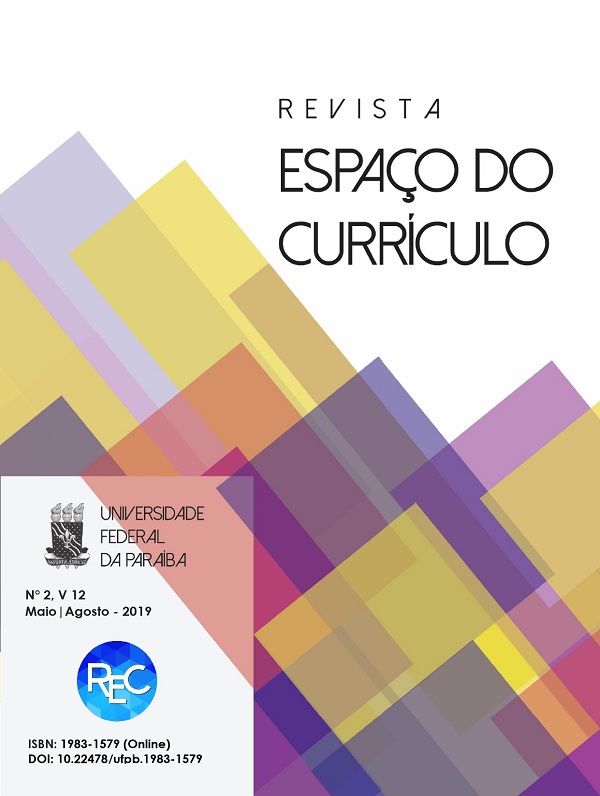TEACHING TRANSPOSITION ON TEXTUAL PRODUCTION TEACHING AT BNCC
DOI:
https://doi.org/10.22478/ufpb.1983-1579.2019v12n2.42062Keywords:
Didactic Transposition., BNCC., Textual Production., High School.Abstract
The National Common Curricular Base (BNCC, 2016) emerges as a result of adiscussion about the need for a common curriculum for the country and proposes for each area of knowledge the contents that should compose the curricula of the schools. Thus, taking into account the area of Languages and the discipline of PortugueseLanguage, we can see that theoretical options are made during the elaboration of this document. For this reason, this paper focuses on the (de)-construction (Le Goff, 1997) of the conceptual and structural architecture of this second version of the document at the secondary level. Based on documentary research, based on a qualitative-interpretative basis and situated in the critical-collaborative field of Applied Linguistics (LA), we sought to investigate Didactic Transposition (Chevallard, 2001), namely, the passage from scientific knowledge to scholarly knowledge, which (re)-defines teaching objects. Therefore, it is important to forcefully unveil the theoretical configuration that emanates from this document as well as theimplications for teaching. For this investigation, we rely on the theory of Didactic Transposition, Chevallard (2001, 1991), Leite (2007), Marandino (2004); Textual Linguistics, Bentes (2004), Brait (2016), Koch (2009); plus Curriculum Studies, Silva (2005), Macedo (2012) and Moreira (2009), to analyze the concept of textual production in this document. The results point to the erasure of theoretical affiliations and a conceptual inaccuracy, which may lead to reading complications. In addition, there is a recurrent link to the grafocentric notion of text, resulting in a less pedagogical view of the teaching object in question.
Downloads
Metrics
References
BENTES, A. C. Linguística textual. In. BENTES, A. C.; MUSSALIM, F. (Orgs). Introdução à linguística: domínios e fronteiras. 4. ed. São Paulo: Cortez, 2004, p. 245-282.
BRAIT, B. O texto nas reflexões de Bakhtin e do Círculo. In: BATISTA, R. O. (Org.) O texto e seus conceitos. São Paulo: Párabola, 2016.
BRASIL. Base Nacional Comum Curricular. 2ª versão. Brasília, DF: MEC, 2016.
CHEVALLARD, Y. Estudar matemáticas – O elo perdido entre o ensi¬no e a aprendizagem. Artmed: Porto Alegre, 2001.
FÁVERO, A. A.; TAUCHEN, G. ; SCHWANTES, L . Da transposição à compreensão didática: sentidos do conhecimento escolar na educação em ciências. Roteiro, v. 37, p. 325-342, 2012.
GARCEZ, L. H. do C. A escrita e o outro: os modos de participação na construção do texto. Brasília: Universidade de Brasília, 1998.
GERALDI, J. W. O ensino de língua portuguesa e a Base Nacional Comum Curricular. Retratos da Escola, Brasília, v. 9, n. 17, p. 381-396, jul./dez. 2015.
KOCH, I. G. V. Desvendando os segredos do texto. 4. Ed. São Paulo: Cortez, 2005.
LE GOFF, J. Documento/monumento. In: Enciclopédia Einaudi v.1. memória-história. Lisboa: Imprensa Nacional – Casa da Moeda, 1997. p. 95-106.
MACEDO, R. S. Currículo, campo, conceito e pesquisa. Petrópolis: Pontes, 2012.
MARANDINO, M. Transposição didática ou recontextualização? Sobre a produção de saberes na educação em museus de ciências. Revista brasileira de educação. maio/jun./ago. 2004, n.26, p. 95-183.
MARCHUSCHI, L. A. Produção textual, análise de gêneros e compreensão. São Paulo: Párabola, 2008.
MOITA LOPES, L. P. Por uma linguística aplicada indisciplinar. São Paulo: Parábola, 2006.
MOREIRA, A. F. B. Estudos de currículo: avanços e desafios no processo de internacionalização. Cadernos de Pesquisa, v. 39, n.137, p.367-381, maio/ago, 2009.
MOREIRA, H.; CALEFFE, L. G. Metodologia da pesquisa para o professor pesquisador. Rio de Janeiro: DP&A, 2008.
PAIS, L. C. Didática da matemática: uma análise da influência francesa. Belo Horizonte: Autêntica, 2002.
PENNA, M. Construindo o primeiro projeto de pesquisa em educação e música. Porto Alegre: Sulina, 2015.
PETITJEAN, A. Importância e limites da noção de transposição didática para o ensino do francês. [Tradução de: Ana Paula Guedes e Zélia Anita Viviani]. Fórum Linguístico, 5 (2): 83-116, Florianópolis, jul. dez., 2008.
SILVA, K. A.; ALVAREZ, M. L. O. Perspectivas de investigação em linguística aplicada. Campinas: Pontes Editores, 2008.
SILVA, T. T. Documentos de identidade: uma introdução às teorias do currículo. 2. ed. Belo Horizonte: Autêntica, 2005.
SOUZA, J. W. A. de ; FERRAZ, M. M. Tr.; COSTA, T. M. de. A significação nos documentos parametrizadores nacionais: relação entre teorias e a prática nos livros didáticos. XVII Congresso Internacional da Associação de Linguística e Filologia da América Latina. 2014. (Congresso).
Downloads
Published
How to Cite
Issue
Section
License
By submitting an article to Curriculum Space Journal (CSJ) and having it approved, the authors agree to assign, without remuneration, the following rights to Curriculum Space Journal: first publication rights and permission for CSJ to redistribute this article. article and its metadata to the indexing and reference services that its editors deem appropriate.
















